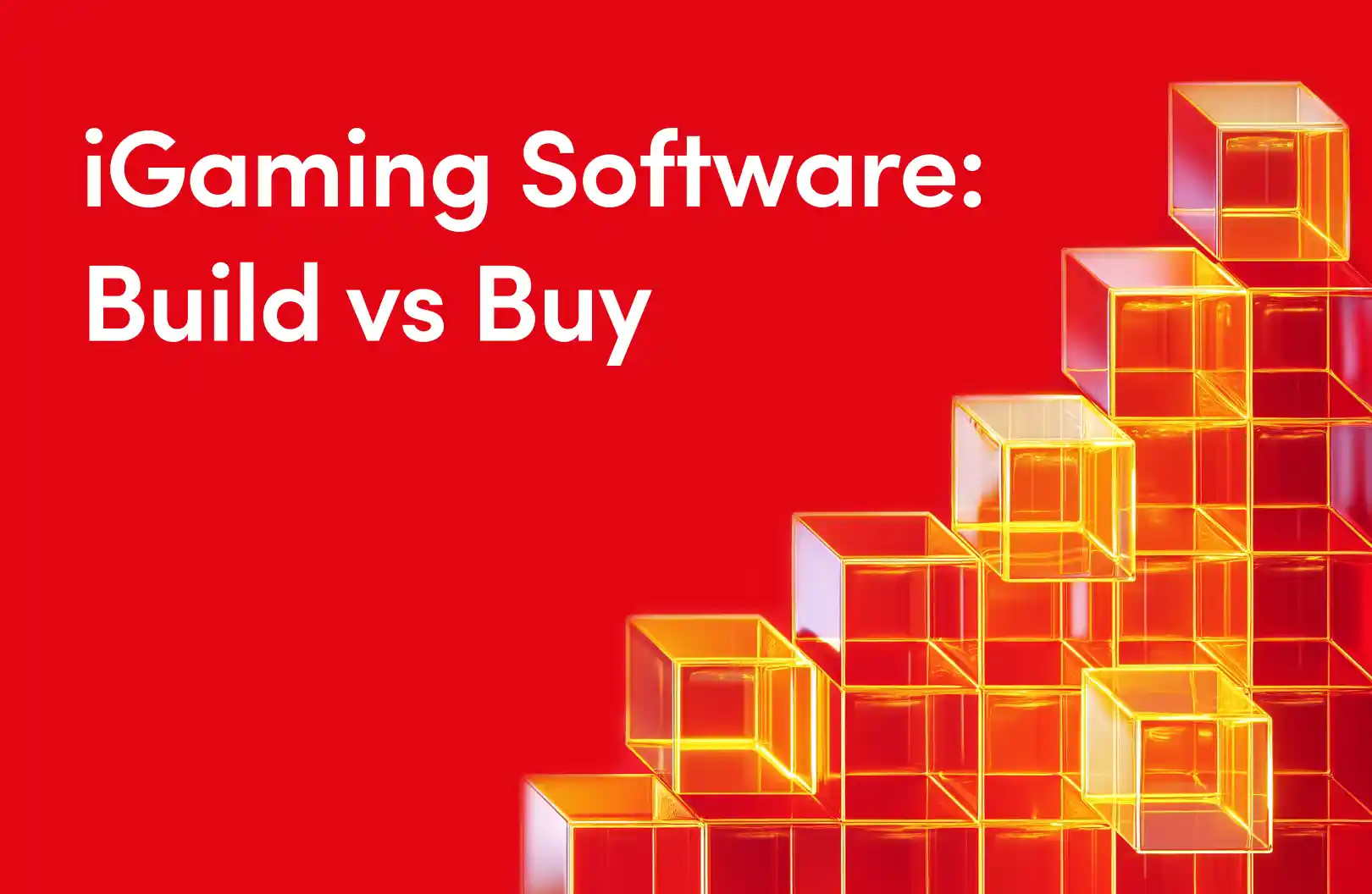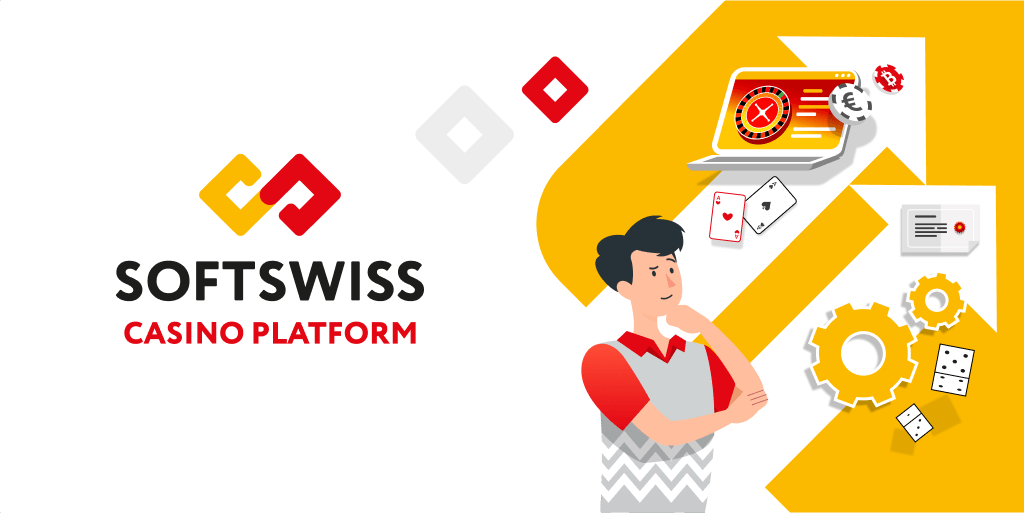The European online gambling market operates under some of the world’s strictest rules, and Spain illustrates this well. Its regulatory framework is detailed and demanding, yet it has not slowed the industry’s expansion. Instead, regulation has shaped a market where sustainable growth depends on compliance, local adaptation, and operational discipline.
Building an online casino in Spain, therefore, requires more than securing a licence. iGaming operators need to align with regulatory expectations, adapt to local habits, and design platforms that can withstand long-term scrutiny. This guide explores how to do that step by step, from compliance to market strategy.
Key Takeaways
- Spain has a rather complicated regulatory environment but strong commercial potential. This makes it a market that rewards compliance-first strategies and local insight.
- Operators must obtain General and Singular Licences issued by the Directorate General for Gambling Regulation (DGOJ). The application process is detailed and requires careful completion at every stage. It also excludes white-label models.
- Operators seeking to meet legal and technical standards must establish a local presence and fulfil financial security requirements of up to €2 million.
- Casino games lead the online market, generating nearly half of all gross gaming revenue (49.6%), while sports betting trails closely behind, capturing 42% of GGR.
- Marketing conditions are tightly regulated. Operators must carefully navigate changing rules around digital promotions, influencer partnerships, and affiliate management.
Why Enter Spain’s Online Gambling Market?
Spain’s iGaming market keeps growing, becoming one of Europe's most appealing. According to the 2024 data, the Directorate General for Gambling Regulation (DGOJ), Spain’s national gambling regulator, recorded €1.45 billion in Gross Gaming Revenue (GGR), showing a substantial 17.6% year-on-year increase.
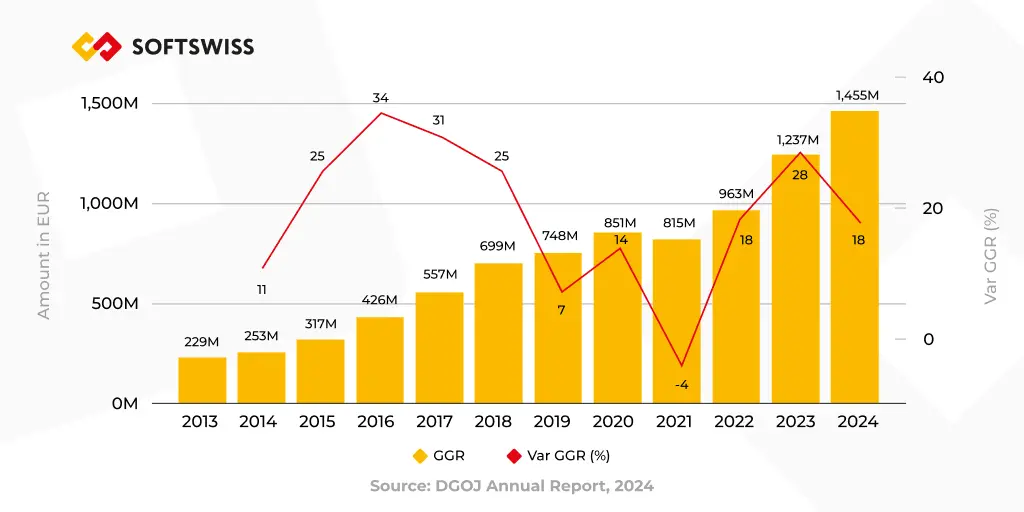
What drives this growth is a sharp rise in player activity: the number of active players reached nearly 2 million in 2024. Around 83.15% of Spain’s online gambling demographic is male, and about 85.7% of players are between 18 and 45 years old.
Deposits and withdrawals also climbed significantly. In total, player deposits reached €4.58 billion (+19.6%), while withdrawals totalled €3.15 billion (+19.7%) compared to 2023. This shows strong user engagement and trust in licensed operators.
Casino games remain the top-performing vertical. Online slots generated €472.2 million, growing by 22.8%, while live roulette brought in €208.8 million. Casino games contributed €730.7 million in GGR – around 50% of the market. Sports betting followed closely, with €608.9 million in revenue (+23.8%), led by in-play bets worth €285.1 million.
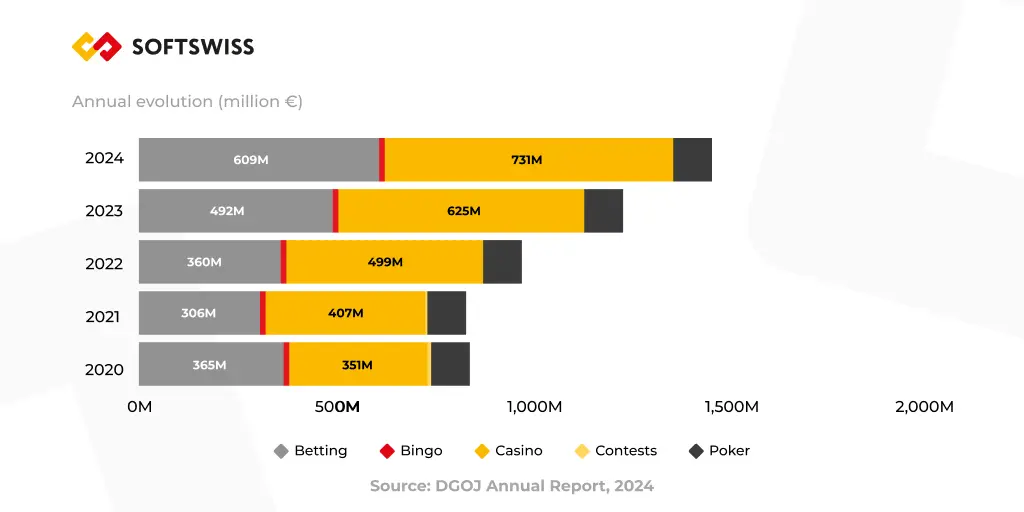
Operator marketing investment also experienced a strong rebound. Spending on advertising, bonuses, and affiliate marketing exceeded €526 million, marking a 30.4% increase compared to 2023. This included €261.5 million on bonuses (+30.8%) and €203 million on advertising (+37%), driven mainly by a 2024 Supreme Court ruling that eased previous limits on digital promotions.
What are the forecasts? According to Astute Analytica’s latest market analysis, the Spanish gambling market is projected to reach around €39.82 billion by 2033, growing at a compound annual growth rate (CAGR) of 18.16% from 2025 to 2033.
Licence Types, Costs and Tax Obligations
In Spain, gambling is regulated at the national level by the DGOJ, the central authority responsible for licensing, compliance, and enforcement within the sector. Any operator wishing to offer online casino games, sports betting, poker, or bingo to Spanish residents must obtain a licence, which involves a two-tier system:
- General Licences give operators the legal right to provide gambling services in three categories: betting, other games (casino-style games such as roulette, blackjack, poker, bingo, and slots), and contests. A General Licence is the fundamental authorisation document required to enter the market and conduct various gambling activities.
- Singular Licences are specific permits required for each type of gambling product an operator wants to offer, such as blackjack, roulette, or poker. These licences let operators provide particular games under the scope of their General Licence.
A gambling licence for an online casino in Spain cannot be obtained at any time, only during specific public tender periods announced by the DGOJ. The regulator evaluates applications from interested operators during these windows based on strict criteria. Once granted, a General Licence lasts for ten years. Singular Licences are valid for three to five years. Both licences can be renewed after a successful regulatory review confirming compliance, allowing operators to maintain their legal status in the Spanish market long-term.
How Much is a Gambling Licence in Spain?
The licensing process in Spain comes with several costs. The application fee for a General Licence is €38,000, and €2,500 for each Singular Licence.
Operators must also provide a financial guarantee as part of the process. For General Licences covering betting and other games, a guarantee of €2,000,000 is mandatory, while for General Licences related to contests, it is €500,000. This guarantee includes cash, real estate collateral, insurance, or other accepted securities. From the second year of operation onwards, the guarantee amount can be reduced, providing some financial relief as the business becomes established.
Note: licence costs are only one of several milestones. Operators must also prepare for ongoing expenses, including taxes, technical infrastructure, regulatory audits, and establishing a legal presence in Spain. These factors are essential for maintaining compliance and ensuring long-term success in the market.
Taxation of Online Gambling Operators in Spain
Spain has a standard tax rate of 20% on GGR for online gambling operators. However, companies that establish their tax residency in the autonomous cities of Ceuta or Melilla benefit from a reduced 10% GGR tax rate under Article 48(7) of Law 13/2011. This option offers a notable advantage compared to other European Union jurisdictions, particularly for new market entrants aiming to optimise long-term profitability and operational efficiency.
Step-by-Step Guide: How to Obtain a Gambling Licence in Spain
Step 1: Establish a Local Presence
Foreign operators must register with the Spanish Tax Agency and appoint a legal representative or open a Spanish office within two to four weeks. This step is essential to meet legal requirements and facilitate ongoing regulatory communication. Associated costs include legal fees and possible office rental expenses.
Step 2: Fulfil Financial Requirements
It is mandatory to prove financial stability by providing bank guarantees to cover liabilities and player protection. An initial guarantee of approximately €2 million is required, which may be reduced after two years of compliant operation. This step involves cooperation from financial institutions and requires thorough documentation.
Step 3: Apply for a General Licence
As mentioned before, DGOJ accepts applications only during designated public tender periods. This process can take several months and requires submission of:
- A detailed online casino business plan outlining strategic and financial information
- Technical documentation describing the online casino platform’s architecture and security measures
- Audited financial statements demonstrating solvency
Step 4: Apply for Singular Licences
After receiving their General Licence, operators must apply for a Singular Licence for each game they plan to offer. Each licence requires a separate application, technical certification from an approved laboratory, and proof of financial capacity. The process typically takes one to two months per licence.
Step 5: Ensure Ongoing Compliance
Once licensed and active in the market, operators must maintain continuous compliance with DGOJ regulations. This includes undergoing regular external audits, ensuring GDPR-compliant data management, and meeting AML obligations under Law 10/2010. Operators must also implement robust risk controls and suspicious transaction reporting procedures. These technical and compliance requirements are detailed in the following section.
Technical and Platform Requirements for Online Casinos in Spain
Spain’s iGaming framework imposes strict technical and operational standards. To comply, operators must either build a secure platform or collaborate with a gambling software developer that follows DGOJ protocols, undergo technical certification, and ensure auditability.
Together with the licensing application, operators must submit a detailed technical project and a preliminary certification report prepared by a DGOJ-accredited laboratory. Within four months of provisional approval, they must complete the certification to confirm full compliance. Once licensed, system audits take place every two years.
Key platform requirements include real‑time monitoring, a certified Random Number Generator (RNG), encryption, secure data centres, and internal control systems to log all gameplay under DGOJ supervision. Any changes to critical system components must be reported and certified before deployment.
Operators must also comply with Law 10/2010 for anti‑money laundering (AML) protocols, including identity verification and financial transaction monitoring in conjunction with SEPBLAC, Spain’s AML authority. Marketing and platform data must be fully auditable and traceable under regulatory scrutiny.
For instance, the SOFTSWISS Game Aggregator holds DGOJ certification, offering a technically compliant solution that enables seamless integration of approved gaming content and services into the Spanish market.
Player Preferences: Popular Games and Payment Methods
Regarding casino games, slots and live roulette remain the most popular among Spanish players, highlighting the strong appeal of interactive and immersive experiences, particularly among players aged 18–35.
Sports betting ranks as the second-most popular segment. Growth in live and in-play betting is offsetting the decline in pre-match football wagers, reflecting evolving player preferences. Interest in horse racing is also rising, signalling a diversification of engagement across the betting landscape.
Poker remains steady, while bingo, the smallest segment, continues to expand modestly, with a 1.9% increase year over year.
Bank cards are the leading choice for deposits and withdrawals, showing their dominance as the most trusted and widely used method. E-wallets and bank transfers also play a role, though to a lesser extent. Among emerging solutions, Bizum is gaining popularity for instant deposits. At the same time, established e-wallets such as PayPal, Skrill and Neteller are valued for their speed and ease of use when withdrawing funds.
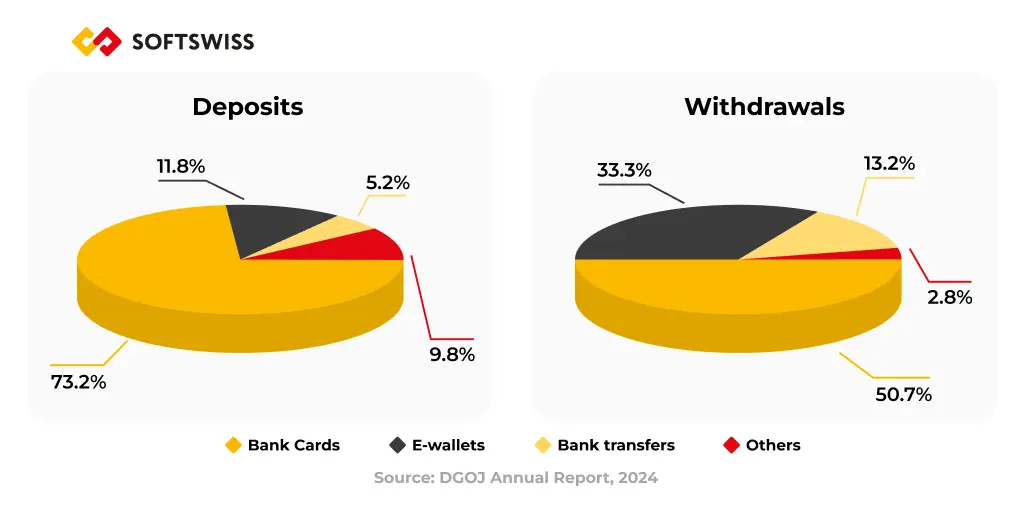
These trends show that Spanish players value speed, ease, and mobile functionality in gameplay and payments. The popularity of accessible casino games like slots, live roulette, and sports betting highlights the need for integrated, smooth, and personalised user experiences. Operators should mainly focus on mobile optimisation, quick deposits, and a wide sportsbook offering to meet user expectations and stay relevant in the market.
Marketing and User Acquisition
Spain’s iGaming marketing landscape experienced a significant shift in 2024 following the partial annulment of Royal Decree 958/2020 by the Spanish Supreme Court. This ruling relaxed previously strict advertising rules, allowing operators to once again engage in digital marketing, bonus promotions, and broader customer acquisition campaigns – provided these remain transparent and socially responsible.
As a result, the market experienced a noticeable increase in advertising activity. Total gambling-related advertising spending reached about €525 million, with €203 million going to digital media, showing a 37.3% year-on-year increase, compared to the financial year 2023. Promotions and bonuses also increased, rising 30.8% to around €261 million, indicating a more competitive landscape.
Even with these changes, the DGOJ monitors advertising closely. Operators must follow clear guidelines on targeting, messaging, and bonus transparency. The regulator has also indicated that marketing rules may be updated more frequently, especially regarding influencer partnerships, social media content, and responsible messaging.
Affiliate marketing remains a vital way to acquire customers, but it faces greater scrutiny. The DGOJ has warned that affiliates with regulated and unregulated brands face compliance risks.
This evolving environment presents new entrants with both opportunities and responsibilities. Companies need a multi-channel strategy to effectively gain users in Spain. This includes compliant digital campaigns, strong retention methods, and localised content. The strategy should meet current DGOJ guidelines and anticipated regulatory changes.
Risks and Opportunities in the Spanish iGaming Market
Spain’s iGaming market presents a compelling mix of opportunity and constraint – an environment where growth is possible, but never without friction. For all its promise, the single most significant barrier for new entrants remains the complex and administratively demanding licensing process. Operators take direct responsibility for all technical, financial, and regulatory aspects of their operations. This is not just a bureaucratic hurdle, but a structural challenge that impacts market entry timelines, capital spending, and risk exposure from the start.
The process can be overwhelming and resource-heavy for smaller operators or those unfamiliar with the Spanish regulatory system. However, this regulatory rigidity has a dual nature. While it raises the bar to entry, it also filters out unserious or underprepared competitors. The result is a relatively stable, high-trust operating environment – an advantage for licensed brands with long-term ambition.
Spain does not permit white-label solutions as a path to market, requiring every operator to hold their own licence. In this context, complete turnkey casino solutions become especially attractive. When delivered by technology providers already licensed in Spain, they offer technical compliance and local expertise – an asset that is becoming increasingly important as industry oversight tightens.
At the same time, the potential is really high. Spain has a digitally native gambling population, a growing appetite for esports and mobile-first experiences, and increasing openness to innovation, whether in gamification, personalisation, or alternative payment solutions. Yet this must be balanced with an understanding that regulatory expectations will continue to evolve, often faster than operators might prefer.
The industry rewards those who are prepared, informed, and connected. With clear plans, operators who can establish a compliant base early will discover many chances for sustainable growth in one of Europe’s most developed gambling markets.
Conclusion
Spain’s iGaming market is mature and competitive, with opportunities for operators to navigate its mix of innovation, culture, and regulations. This is not a new territory; it’s a market where players expect smooth and engaging experiences shaped by years of interaction with leading local and global brands.
By entering the Spanish gambling market, operators can create a sustainable and compliant business in a region that values integrity as much as innovation. To achieve this, they need to think beyond simply launching: success involves choosing the right partners, investing in infrastructure that meets regulatory demands, and viewing compliance as a competitive edge rather than a limitation. In a market where trust is crucial, meeting regulators' standards is not only a legal requirement but also essential for building long-term credibility and growth.
Contact the SOFTSWISS team to discuss customised solutions for entering and expanding in the Spanish iGaming market.

